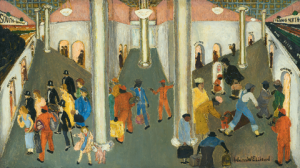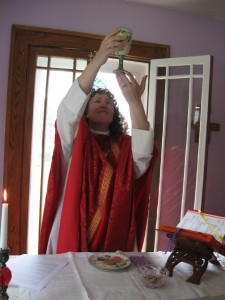May be Rachel Shteir should've just reviewed the books
 Last week, Thursday night found me at the Harold Washington Library in Chicago with my good friend, Lainie Petersen, to hear Thomas Dyja talk about his new book, The Third Coast: When Chicago Built the American Dream. Both Dyja and the audience were excited that the book was going to be on the cover of The New York Times Book Review, and be reviewed it its pages. That excitement didn’t last long when Rachel Shteir’s “review” of The Third Coast and two other books about Chicago came out. Instead of reviewing the three books Shteir wrote an op-ed piece about what she hates about Chicago (the only three things she could find to like were: “The beauty of Lake Michigan. A former rail yard has become Millennium Park. Thanks to global warming, the winters have softened.”). She did make some good points about Chicago’s sins: corruption, the mob, nepotism, and the shooting violence in the city. But these were overshadowed by her diatribe, and a lot historical inaccuracies she cited in the article. She also portrayed Dyja’s book as a cynical take on Chicago’s history of how it all went wrong under the first Mayor Daley. But I know the way she “interpreted” Dyja’s book was wrong, because last week I heard Mr. Dyja talk about his book. I had a nice chat with him as he signed my book, and I had started reading it. I first found out about this op-ed piece masquerading as a book review on The Chicago Reader’s blog, The Bleader in Mike Miner’s insightful and accurate take-down of Shteir, “Not Quite Detroit: Chicago as described by a New York Times book critic.” I made this response:
Last week, Thursday night found me at the Harold Washington Library in Chicago with my good friend, Lainie Petersen, to hear Thomas Dyja talk about his new book, The Third Coast: When Chicago Built the American Dream. Both Dyja and the audience were excited that the book was going to be on the cover of The New York Times Book Review, and be reviewed it its pages. That excitement didn’t last long when Rachel Shteir’s “review” of The Third Coast and two other books about Chicago came out. Instead of reviewing the three books Shteir wrote an op-ed piece about what she hates about Chicago (the only three things she could find to like were: “The beauty of Lake Michigan. A former rail yard has become Millennium Park. Thanks to global warming, the winters have softened.”). She did make some good points about Chicago’s sins: corruption, the mob, nepotism, and the shooting violence in the city. But these were overshadowed by her diatribe, and a lot historical inaccuracies she cited in the article. She also portrayed Dyja’s book as a cynical take on Chicago’s history of how it all went wrong under the first Mayor Daley. But I know the way she “interpreted” Dyja’s book was wrong, because last week I heard Mr. Dyja talk about his book. I had a nice chat with him as he signed my book, and I had started reading it. I first found out about this op-ed piece masquerading as a book review on The Chicago Reader’s blog, The Bleader in Mike Miner’s insightful and accurate take-down of Shteir, “Not Quite Detroit: Chicago as described by a New York Times book critic.” I made this response:
Shtier’s article makes one of Dyja’s points perfectly from his talk last week at the Harold Washington Library. Dyja said that one of the hallmarks of Chicago (then and now) is the city’s inclusivity and intimacy. He contrasted that with NYC’s exclusivity: you have to know the right people to get in the right places, so you can rub where you go in everyone else’s face. Whereas in Chicago everyone’s welcome at the party. In contrast to how she depicted Hefner as free sex, Dyja said that Hefner was key in this because Playboy showed men how to come to the party and act at it. Hefner showed Playboy members how to live in this new, swanky America and everyone was welcome. Shtier’s derogatory attitude about Chicago shows NYC’s uppity exclusivity like nothing else can. She doesn’t like Chicago because she doesn’t like how inclusive we are, which comes through in Lina’s comment on the differences in the artistic communities between Chicago and NYC. Here you’re welcome to come and experiment and play all you want (another Dyja’s 6 qualities that produced the Chicago of The Third Coast); whereas, in NYC you have to have the right pedigree and credentials to get in.
I’ve only started reading The Third Coast, but based on Dyja’s talk last week, I think Shtier’s review warps the book into what she wants the book to be: why Chicago will never be as good as NYC. I think Ms. Shtier needs to move back to NYC since she’s so miserable in Chicago.
This was Thomas Dyja’s response to my comment:
Thank you Shawna, for sharing some of what I said at the library last week. Before people start to confuse my book with a review of it, I hope they give THE THIRD COAST a read. It’s by no means a take down of Chicago; if anything it’s an affirmation of the city’s importance to America.
I did have to qualify my “everyone’s invited to the party” comment because Chicago is one of the most racist and segregated cities in the U. S.:
I realize Chicago has its evil side. I was horrified when I moved here in 2006 by the nepotism of this city that blindly voted for Todd Stroger, who was obviously not qualified in any way, shape, or form for the office, but they “had” to vote for him because he was the Democrat. Someone made the point about my previous comment that not everyone was invited to the party in Chicago, citing Chicago’s racism and segregation. I absolutely agree. I was citing a point from Dyja’s talk that was actually based on the book, and not Shteir’s opinion about Chicago.
I should also add that Dyja does not paint in the broad strokes in the everybody’s invited to the party that I wrote about in my first comment. He talks about Chicago’s racism and segregation. No Bronzeville was not invited to the party during The Third Coast years. They had their own party: The Black Chicago Renaissance. But as Bontemps said: The main difference between the Harlem Black Renaissance and the Chicago Black Renaissance was that in Chicago they didn’t need the finger bowls. Harlem’s Renaissance was funded by upper-class white patrons, so only the right black artists were admitted. But Chicago’s Black Renaissance was a grass roots art movement, and most of the artists worked other jobs to support themselves while they made incredible art that was a scathing, beautiful and haunting commentary on Chicago’s segregation and racism. If you haven’t seen the They Seek a City exhibit at The Art Institute, I highly recommend it. It’s phenomenal. I’m sorry I painted that so broadly, but I still think that Dyja has a valid point: Chicago is much more inclusive, and NYC prides itself on being exclusive.
But the thing that bothered me the most wasn’t all the Chicago bashing. Rachel Shteir did not review the books. She wrote an op-ed about why she doesn’t like Chicago. As a writer I can’t imagine finally having a book reviewed in the Times then seeing that my book didn’t get reviewed–the reviewer took the opportunity to bash the subject of my book. I was happy to hear my friend Erin Shea Smith, the Vice President of Digital Content at Edelman nail this point home this morning on Chicago’s local NPR station: Shteir, as a book critic, did not do her job. She did not review the three books she was paid to review. She wrote an op-ed piece. An op-ed piece that The New York Times then published as a book review. There has been a fabulous discussion on Erin’s Facebook page about this “book review,” Erin’s response on NPR, and all of our responses. The main reason Erin was on NPR was that Shteir made a comment that Chicago had so few women writers. She named two: Nami Mun and Eula Biss. The response were lists of women writing in Chicago on both blogs and Facebook, and Erin is one of those writers. In a discussion on Erin’s Facebook page I made this observation (which I also shared in the Bleader’s comments):
Shteir is not doing women writers any favors. The Times does not review that many books written by women, and they don’t have that many women book reviewers. Publishing an op-ed instead of a review reinforces their sexist belief that women shouldn’t be taken seriously in the literary world. She whined that Chicago doesn’t have that many women writers, but she didn’t do us any favors by writing a fluff piece for the Times Book Review.
I’ve now looked up the numbers to back up that assertion. In 2012 The New York Time Book Review had 40 female book reviewers (down from 52 in 2011) compared to 215 male book reviewers. The reviewed 89 books by women compared to 316 books by men (Vida Count 2012). Earlier this month Deborah Copaken Kogan wrote “My So-Called ‘Post-Feminine’ Life in Arts and Letters” for The Nation. Last October, Sarah Sentilles wrote “The Pen is Mightier than the Sword: Sexist responses to women writing about religion” for The Harvard Bulletin Review. Both women cite in excurciating detail how both the literary and religious writing worlds do not take them seriously as authors and experts in their areas. Kogan cites how book after book, the cover was changed to look girly and given titles that did not reflect the content of her books, along with the fact that none of her books have reviewed by The Times. Sentilles writes how critic after critic treated her like she was a child instead of a 38 year old women with an M. Div. who knew what she was talking about. Both articles made me question if I really wanted to keep doing this writing thing. It’s hard to keep going when it looks like nothing is going to change. Rachel Shteir is one 1 of 40 female book reviewers for The New York Times Book Review, and “Chicago Manual: ‘The Third Coast’ by Thomas Dyja and More” plays right into the sexist attitude of the publication that women authors aren’t worth taking seriously. After all she couldn’t even be bothered to right a simple book review.
But as I wonder if things will ever change, and if this life in the arts, letters, and religion is worth it, Erin and her wonderful friends as well as the brave black artists of The Chicago Black Renaissance remind me that art can be used as a weapon to change things. Erin, Neil Steinberg (who’s book also was not reviewed in Shteil’s op-ed), and Morning Shift’s host Tony Sarabia make the point that a lot of Chicago’s famous artists and authors get some of their best material from all of Chicago’s evil and sin (you can listen or download the podcast here). On Erin’s Facebook post Adam made this comment:
They were talking about some of the characters that we’ve had in Chicago politics and crime and such. And Miner’s quoting of Atlas bit about the “sinful city” that fueled Saul Bellow’s art. Look at what Mike Royko had to write about, or Studs Terkel, or Neil Steinberg, Mary Schmich and our current writers. Great source material to start with.
My response was:
This city, its politics, its corruptions, and all of its wonderful ghost stories (I write urban fantasy) are a writer’s wet dream. If Chicago didn’t have its myriad of sins and just weird shit, we writers would be up the creek. The same is true for other artists. I recently saw the exhibit at The Art Institute, They Seek a City, that has a lot of work that came from Bronzeville artists during Chicago’s Black Renaissance. They are scathing, beautiful, and haunting commentary on Chicago’s racism and segregation. All of Chicago’s sins is what makes it such a rich artistic city. Or as Laszlo Moholy-Nagy said: “There is something incomplete about this city and its people that fascinates me; it seems to urge one on to completion. Everything still seems possible.” And he said that in the 1930s. I think its still true today.
Art: writing, painting, photography can change things. In Chicago we’ve never done art for art’s sake. Our art rises like dandelions in the cracks of the sidewalk as Thomas Dyja put it. Our art is grounded in our real life about real life problems and seeks justice in the face of oppression, corruption, sexism, and racism. Shteir implies that Chicagoans just go along with the flow of Chicago’s evils, but she’s wrong. At least she’s wrong when it comes to Chicago’s artists. We have a long history of creating art to force social change. And for that reason I will keep writing. If the establishment never recognizes me so be it. I will leave a record that as a woman writer, I did everything I could to change to patriarchal and sexist literary and religious writing worlds.







